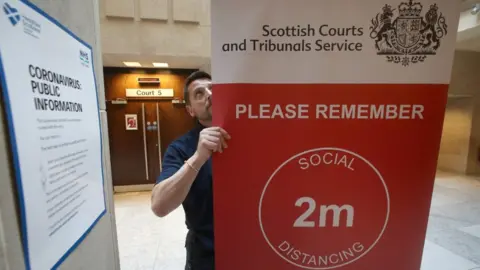Covid in Scotland: 'Majority' of criminal trials on hold for lockdown
 PA Media
PA MediaThe majority of criminal trials are to be put on hold while Scotland is in lockdown, the courts service has said.
Until the end of February only the "most serious" trials will proceed, to reduce the number of people needed to attend court during the pandemic.
The courts service said this would cut the overall number of criminal trials taking place in lockdown by 75%.
Non-criminal court business such as civil and family cases are to continue via video links and virtual hearings.
Justice Secretary Humza Yousaf said he was "acutely aware" of the impact of delays on victims, witnesses and the accused, but said "all parts of society must step up our efforts to help safeguard health".
There have been warnings that a backlog of trials, already building before the pandemic, could now take up to a decade to clear.
The courts system has brought in a series of innovations to continue trials during the pandemic, with socially-distanced juries sitting in cinemas and more use of digital technology.
All courts are to remain open during the current lockdown, but the majority of trials are to be postponed due to concerns over a surge in infections.
Serious allegations
Only trials concerning serious allegations such as sexual offences and those involving domestic abuse and children will proceed, alongside those where the accused is already in custody.
The bulk of non-custody trials and procedural hearings will be adjourned, although "urgent" matters can still be fast-tracked.
The courts service said the "current planning assumption" was that this would continue until 28 February, although this will be kept under review.
Cases which do not involve a jury - such as criminal appeals and civil cases in the Sheriff Court and Court of Session - will continue to be conducted remotely.
 Getty Images
Getty ImagesScottish Conservative justice spokesman Liam Kerr said the news would be a "body blow to crime victims and witnesses", saying they would be "left in limbo".
He added: "The SNP have had 10 months to deal with this and they must now work with lawyers, prosecutors, court staff and the judiciary to alleviate the impact of these postponements and find practical and safe ways to ease the logjam.
"It is also vital these postponed cases cannot be quietly abandoned. Doing so would be a betrayal of victims and risk undermining public faith in the justice system."
Mr Yousaf said the move was justified if it would help reduce the number of people who have to attend court in person, pointing to "very concerning rates of infection, hospitalisation and death" due to Covid-19.
However said the courts were "logistically and operationally in a much better position than in the spring when a full shutdown of criminal trials was needed".
He said: "The Scottish government will continue to work with justice organisations and victims representatives in the weeks and months ahead, to consider all options to respond to the inevitable increase in cases awaiting trial, as well as the wider impact of the on-going public health challenges across the justice system."


